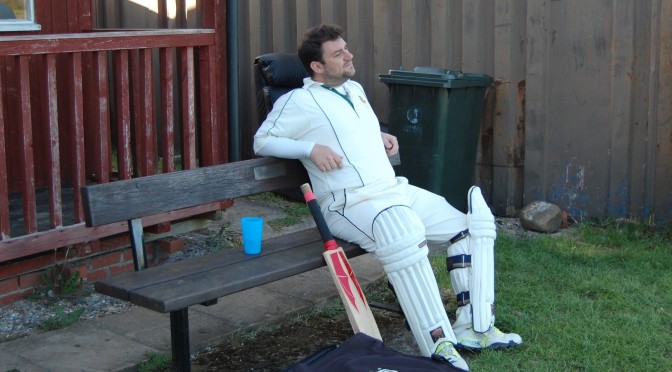King School Old Boys were at it before the traffic even began to build on the Coast Road. This team, long known for its grumpiness at having to take the field at all in order to be acknowledged as anyone’s superiors, plumbed the depths this time. The careful orchestration of an over-running schoolboys’ game, with its endless supply of adolescent batsmen, designed to frustrate the visitors to the point where they conceded the game helplessly and genuflected before their natural masters without a ball being bowled, was all too obvious.
But Mallards CC were having none of it. They watched and waited. And they practiced. And they practiced. Becoming rattled, KSOB wondered openly if the match should be abandoned on account of the ebbing daylight. Mallards CC practiced some more.
Desperately, KSOB looked to Collingwood for legitimacy and guidance. But the Admiral showed them only his broad back , his gaze never leaving the waves on which he had made his name. Having spent his whole career covering for slightly posh kids, he was not about to fritter away this fresh, golden evening the same way. And so it began, because Mallards CC were not going anywhere. The KSOB fleet left its twee, ivy clad refuge in the river’s mouth and engaged the pretenders in a truncated action of 16 overs. Battle was join’d.
The disgust of Warwick at having to take guard to Brown and Dunhill was evident in every tiny movement. His defensive shots sighed at the futility of it all. Didn’t they realise he could have been playing tennis? At the other end, Spiller showed no remorse at all for being left handed, instead feeding on the injustice of his deformity to power a series of furious boundaries.
Paralysed with indignation at having to face another over from the persevering Brown, Warwick was caught on his crease with leaden feet and had his timbers shivered to the snarling delight of those who had suffered his upright disdain in previous campaigns.
Spiller’s frenzy intensified, his second six catching unawares a patch of rhubarb in the adjoining allotment, which anxious players and spectators later saw being carried from the ground in plastic bags. For a brief moment, everyone remembered it was only a game.
The younger Moir, a gifted solicitor in at Three, was brisk and erect until he encountered Dunhill suddenly at his beguiling best, and succumbed to the vice of his profession in recording three shots on his timesheet when the ball had only required one . Dragged on, forty-seven for two in the sixth.
Devlin, at four, was in no shape to deal with Dunhill and offered only a pad, and was on his way. Spiller retired, his point made- clearly, a man who likes to WinALot…
The bully boys would not take this lying down however. A revival was staged in the persons of Langlands and Peffer, who took a particular liking to McGuinness, as he sought to flog the indolence from the middle of this kiddies’ pitch. Hunt explored a different length, remembering the inspiration Barnes Wallis once took from Nelson (or probably Collingwood….), bowling a mixture of floaty, skipping half-volleys and the odd accidental yorker, of the sort which did for Frenchie at the Battle of the Nile. But McGuinness it was who had his man, Peffer imitating “that meadow cutting scene from Poldark” once too often and scything one high into the sky, only for it to plop meekly into D-Mac’s grateful buckets.
Langlands had no answer to Wizzback’s infuriating gameness of flight and missed one, while S. Black had seen enough and scampered for cover to rest a grumbling thigh with two balls left. An edge off the last ball from Hunt, smartly taken at the wicket by the fleet-footed Kent, closed the innings on 121/7.
And Kent was not finished, opening the reply with a salvo of purpose and intensity against the elder Moir, while Scott (pictured above, practicing) played too early at a ball from the suddenly-limber-again S.Black to depart for nought. Butcher played the innings of a man torn; fiercely loyal to that other son of Norfolk who had chased Napoleon from Corsica to Cadiz to Cartagena, yet unable to deny that the local hero who towered above him, in the fading light of his adopted city, had really done all the work. His agony did for him and S. Black had a second, Butcher dragging on for 7.
Kent’s onslaught got beyond itself, the buccaneering opener sending one into the leaden sky and straight down again to leave him just short of retirement. Suddenly, Black was bowling from both ends…. Was this Black Magic? No, there were just two of them, in fact three! One more and we’d have had enough for a Sardinian flag, and the Admiral might have chuckled at the memory; but three was enough for Taylor and Jordon, who were sent back by the miserly I. Black, as sparing of energy as a crocodile and every inch as deadly, for 2 and none respectively. Skipper Wood, leading as ever by example, dragged one onto his stumps as so many of his troops would do, departing for 4 to Willet.
Enter Wisbach, whose blade of willow proved as broad and sound as his heart of English oak. McGuinness followed his dignified lead, both men playing tall and straight, not to be goaded into futile savagery by the sneering victors, and seeing Mallards to a tranquil embayment on 58 for 6.
KSOB schemed like Bourbons to make sure Mallards didn’t win this game; but Mallards stood tall and resolute, to make sure they would lose it like Englishmen.

